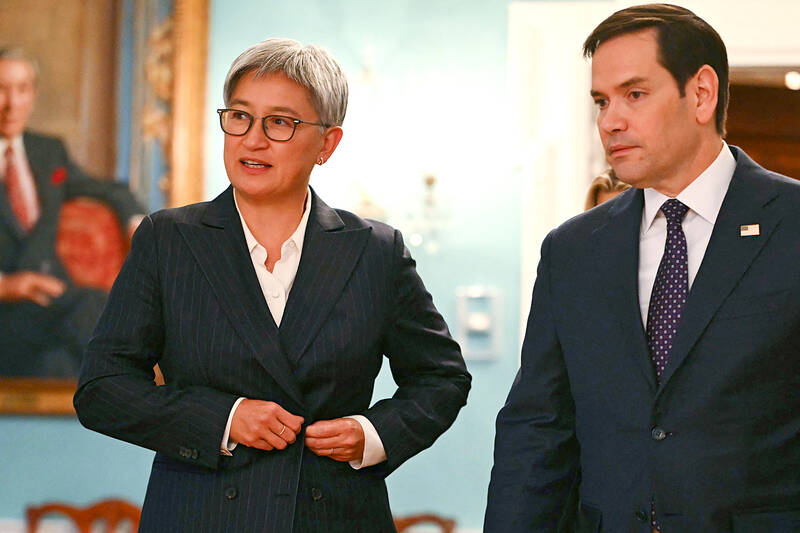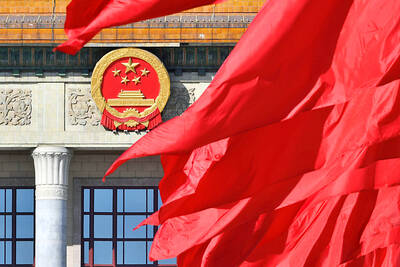US Secretary of State Marco Rubio on his first full day in office on Tuesday warned jointly with Japan, India and Australia against coercive actions in Asia, in an apparent warning to China over its actions at sea.
Rubio met in Washington with his counterparts from the Quadrilateral Security Dialogue (Quad) a day after the inauguration of US President Donald Trump, who has vowed to push back against China.
Rubio and his counterparts from the three other nations in a joint statement promised to work toward a “free and open Indo-Pacific” region.

Photo: AFP
The four said they support a region “where the rule of law, democratic values, sovereignty and territorial integrity are upheld and defended.”
“We also strongly oppose any unilateral actions that seek to change the status quo by force or coercion,” the statement said.
The ministers confirmed they would work to hold a Quad summit previously scheduled for this year in India, which would mean an early trip by Trump to the ally.
Rubio also met separately with each minister.
With Japanese Minister of Foreign Affairs Takeshi Iwaya, Rubio discussed North Korea and “joint efforts against China’s destabilizing actions,” US Department of State spokeswoman Tammy Bruce said.
China has had rising friction with the Philippines, a US ally, as it stakes claims in territorial disputes.
Rubio in his confirmation hearing also vowed to deter China against an invasion of Taiwan.
Rubio, a three-term senator who a day earlier was unanimously confirmed by his peers, arrived at the state department with a promise to defend US diplomats and pursuing Trump’s “America first” policies.
“I expect every nation on Earth to advance their national interests. And in those instances — and I hope there will be many — in which our national interests and theirs align, we look forward to working with them,” Rubio said.

US PUBLICATION: The results indicated a change in attitude after a 2023 survey showed 55 percent supported full-scale war to achieve unification, the report said More than half of Chinese were against the use of force to unify with Taiwan under any circumstances, a survey conducted by the Atlanta, Georgia-based Carter Center and Emory University found. The survey results, which were released on Wednesday in a report titled “Sovereignty, Security, & US-China Relations: Chinese Public Opinion,” showed that 55.1 percent of respondents agreed or somewhat agreed that “the Taiwan problem should not be resolved using force under any circumstances,” while 24.5 percent “strongly” or “somewhat” disagreed with the statement. The results indicated a change in attitude after a survey published in “Assessing Public Support for (Non)Peaceful Unification

The CIA has a message for Chinese government officials worried about their place in Chinese President Xi Jinping’s (習近平) government: Come work with us. The agency released two Mandarin-language videos on social media on Thursday inviting disgruntled officials to contact the CIA. The recruitment videos posted on YouTube and X racked up more than 5 million views combined in their first day. The outreach comes as CIA Director John Ratcliffe has vowed to boost the agency’s use of intelligence from human sources and its focus on China, which has recently targeted US officials with its own espionage operations. The videos are “aimed at

‘MISGUIDED EDICT’: Two US representatives warned that Somalia’s passport move could result in severe retaliatory consequences and urged it to reverse its decision Minister of Foreign Affairs Lin Chia-lung (林佳龍) has ordered that a special project be launched to counter China’s “legal warfare” distorting UN Resolution 2758, a foreign affairs official said yesterday. Somalia’s Civil Aviation Authority on Wednesday cited UN Resolution 2758 and Mogadishu’s compliance with the “one China” principle as it banned people from entering or transiting in the African nation using Taiwanese passports or other Taiwanese travel documents. The International Air Transport Association’s system shows that Taiwanese passport holders cannot enter Somalia or transit there. The Ministry of Foreign Affairs (MOFA) protested the move and warned Taiwanese against traveling to Somalia or Somaliland

SECURITY: Grassroots civil servants would only need to disclose their travel, while those who have access to classified information would be subject to stricter regulations The government is considering requiring legislators and elected officials to obtain prior approval before traveling to China to prevent Chinese infiltration, an official familiar with national security said yesterday. President William Lai (賴清德) in March announced 17 measures to counter China’s growing infiltration efforts, including requiring all civil servants to make trips to China more transparent so they can be held publicly accountable. The official said that the government is considering amending the Act Governing Relations Between the People of the Taiwan Area and Mainland Area (臺灣地區與大陸地區人民關係條例) to require all civil servants to follow strict regulations before traveling to China.